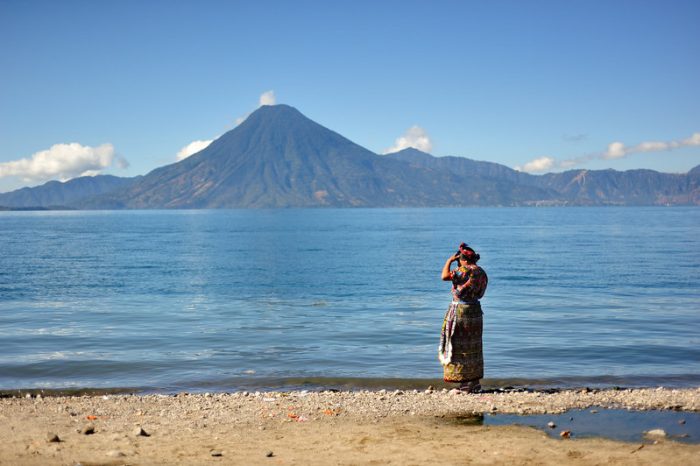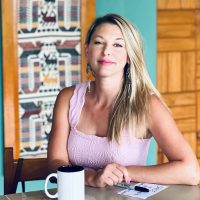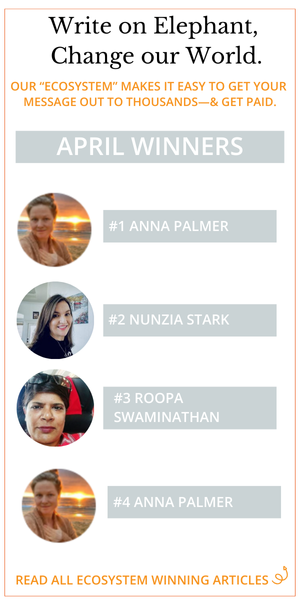We appear to one another as faces of different races, each carrying our own tragic and infamous histories.
But it was all of our great grandmothers who turned to Earth in their times of desperation—to heal our ancestors from sickness, dress their wounds during war, keep the bloodline alive upon the planet. And it is that one planet which has parented us all.
We each have a memory in our DNA of being in a listening relationship with the conscious, communicative being we know as Earth. Natural design was the original teacher to our lineages, the seasons were the first prophets, the harvest was the first matrimony.
And now our collective crises, including climate change, the eradication of biodiversity, antibiotic-resistant superbugs, and dwindling immune and mental health, beckon us to call forth that memory. To weave wholeness back into our planet by reclaiming our original identity as family members of the ecosystem. But how can we do that with the scars of history tearing us apart?
As an American woman living in an indigenous Mayan community in Guatemala, I’m hypersensitive to the fact that the stains of humanity’s past are still sitting heavy on our souls—waiting there to be poked and prodded by some ignorance in the world. In any moment, a trigger can hijack our sense of belonging or safety, or immobilize us with guilt over what those who came before us have done.
No matter where you live on the planet, what culture you’re from, whose blood your ancestors have on their hands, or what dispossession or trauma you’ve faced, the tides won’t turn on humanity’s fate until we retrieve a shared memory of ourselves, and of our place in the world. A memory that’s been forgotten, but still sits there on the bookshelves of the Akash, waiting to be dusted off and reminisced by each of us. Without this memory, we’ll unwittingly leave behind hellish consequences for future generations. On the hallowed ground where I live, I am always face-to-face with those consequences.
Some 84,000 years ago a massive volcanic explosion took place here, known as the Los Chocoyos eruption. When the mouth of the volcano collapsed, it created a huge caldera that later filled with water; that water is now life source to me and over 70,000 people dispersed throughout the Mayan mountain towns that surround Madre Lago, or what the world now knows as Lake Atitlán.
From the land where my current life unfolds, I can awe over four volcanoes in plain sight: Tolíman, Atitlán, San Pedro, and Fuego. I spend mornings laughing at the ducks who stick their asses up in the air as they source sustenance just beneath the lake’s surface. But my favorite is watching smoke from Fuego shoot up into the sky—a steady reminder that this spinning rock upon which we live also has a beating heart.
It’s that aliveness that teases me, conjures a fantasy of myself sprinting into the sunlight atop the water, spooking the ducks, my mouth open wide with an ear-to-ear smile, splashing childishly into this ancient and natural wonder that has kept the Mayan culture alive in these parts, despite the wars, spiritual persecution, and colonial barbarism that have made strides in destroying that culture.
But I can’t open my mouth and smile and splash. And I can’t behave childishly in my relationship to Madre Lago. Because if I accidentally swallow her droplets, I can become ill for months. I know because it has already happened, numerous times. The water source that carried bloodlines through history is now contaminated with multiple threats to future generations.
I’m not living a childish fantasy, I’m taking responsibility. I witness Madre Lago and watch over her, like the ancestor I’m becoming. Her ripples remind me of the wrinkles in my great grandmother’s face. Inside of them are secrets of her youth that only she keeps because the others who know about them have come and gone. The flickers of light upon her surface are playful winks, signaling me to sit down and listen to universal memories that only the surrendered and present are privileged to hear.
I kneel at her throne, surrounded by tall water reeds that cocoon our communion, a sacred space for invisible messages to flow between me and Madre Lago. One hour before sunset, the birds are right on cue with their hilarious symphonic bickering, like groups of corporate Americans meeting for happy hour cocktails at their favorite watering hole. I laugh at the similarities in the cacophony between the natural world and the human world.
That’s when the wind interrupts me, collecting the molecules of my laughter and delivering them to the nearby willow tree. Wise Willow immediately gets to work, scanning the aroma of my breath to determine the state of my health. She uses this data to rearrange her own molecules, creating the exact chemical compounds that I need to be balanced and whole. Wise Willow recognizes my wellness as her wellness too, because she senses me as a family member of the ecosystem. To her, there is no separation between the natural world and the human world. We are relatives of the same Earth.
The winds pick up, sending rushes of waves onto the shore of Madre Lago, amplifying her voice, a sign that she wants me to pay attention. That’s when I see Rose, my neighbor, walking toward me. She’s dressed from head to toe in traditional Mayan clothes, handwoven cotton in bright red and deep blue, her shoulders covered by an embroidered top and her knees hidden by a long and narrow skirt. A colorful handmade belt, or “faha,” snuggles around her waist, protecting her feminine energy from the outer world. Inside the stitching are secret stories of her people. Her swaddled newborn boy sits at her bosom.
As Rose nears me, something peculiar happens. Her smooth, caramel face morphs into that of her great grandmother, and then the great grandmother before her. I see her walking in the jungle, her baby’s cries piercing through the quiet of the forest to let the world know that it’s in pain, sick, and soon dying. The concerned mother has no medicine cabinet full of lab-made chemical compounds with carefully labelled dosage instructions. She has no M.D. with eight years of formal education to consult. No microscopes, no petri dishes, no vaccine schedule. It’s just her and the wild—her baby’s survival hinges on her own intuitive connection with the surrounding ecosystem. I watch to see what she will do, but it seems that I’m no longer watching from my own eyes, or even from this timeline…
I’m now an infant, looking up from my great-great grandmother’s bosom. She does not wear Mayan clothing and her skin is different from Rose’s, a lighter, olive tone. I watch her eyes scanning her surroundings, searching, scared. She sings in Greek, the cadence calming both me and her as she wanders through the wild, alone and on a mission to save my life. The feeling in the air around us shifts suddenly, as if a portal of crystal clear reception is opening up, allowing messages to pass between the realms of spirit, nature, and human. Great-great grandmother goes quiet and still. I feel her drawn in and toward something, a mysterious plant with no scientific name because science does not yet exist. In this moment she knows, and I feel, the medicine has been provided, and our lineage will carry on.
Great-great grandmother’s face morphs back to an elderly Mayan woman, who sees me and I see her, only for a moment, until blurring into the smooth caramel skin of my neighbor, Rose, who kneels beside me at the throne of Lake Atitlán. We’re reunited here, in a present timeline. Rose tells me that she has just used a native plant to treat her baby’s infection. The same plant that her mother, and her mother’s mother used to keep their own children alive. Rose’s brown eyes beam with maternal victory and competence, a matriarch who’s just reaped the rewards of her heritage.
My green eyes smile back at her, and while we appear to each other as faces of different races, our hearts beat in rhythm with the Schumann Resonance that can be felt in our bones as Fuego volcano spews lava and shoots smoke into the sky that we both breathe. Together, we turn our gaze toward the horizon, where the lake meets the mountain fog descending upon us, Earth Mama’s blanket tucking us both in for the night. We bow our heads and say thank you to this planet who has parented us, and every face of a different race.
May you, dear reader, dust off these memories of your own Akash, and join with your neighbors to regenerate the biodiversity and vitality of this planet we all call home. For before our infamous histories and cultural traumas, we were truly reared by the same mama.
~

 Share on bsky
Share on bsky




Read 12 comments and reply